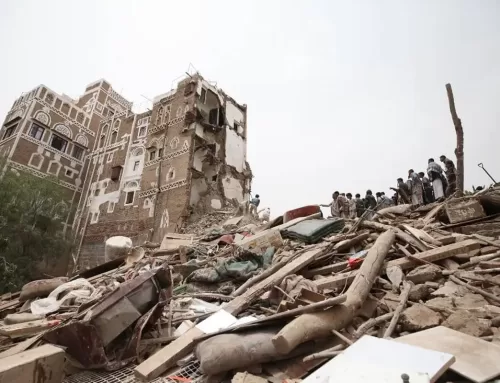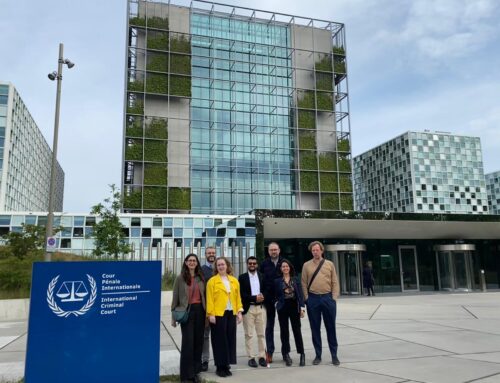Mwatana: The Yemeni government has failed to protect the rights of its citizens
(Sana’a) Tuesday, February 15, 2023
In a submission made to the UN Committee on Economic, Social and Cultural Rights (CESCR) in late January 2023, Mwatana for Human Rights (Mwatana) stated that the internationally recognized government of Yemen has failed to fulfill its legal obligations to respect, protect and fulfill human rights, particularly the economic, social and cultural rights of individuals within its territory.
Since the beginning of the conflict in Yemen, in September 2014, civilians in Yemen have been subjected to multiple violations, including violations of their rights guaranteed by the International Covenant on Economic, Social, and Cultural Rights (ICESCR). During the conflict, all parties to the conflict have repeatedly violated human rights in Yemen. This has affected the food security of civilians and their access to clean water and exacerbated diseases that can be prevented under normal conditions. Civilians have been deprived of their right to education and access to health care in an already crumbling health system, in the face of a deteriorating economy and a humanitarian situation that humanitarian organizations have for years described as the world’s worst humanitarian crisis.
The ICESCR, which Yemen ratified on February 9, 1987, obliges the internationally recognized Yemeni government to respect, protect and fulfill the economic, social, and cultural rights of people living in Yemen. The obligation to respect human rights requires States to refrain from interfering, directly or indirectly, with the enjoyment of social and economic rights by individuals. As for the obligation to protect, it requires States to prevent third parties from interfering “in any way” with these rights. The obligation to fulfill human rights requires States to take positive steps to ensure the social and economic rights of the population, particularly the progressive realization of these rights to the maximum extent even when a state’s resources are scarce. It also requires States to take immediate measures to eliminate discrimination, ensure that acquired rights are not reversed, and ensure the realization of at least the minimum levels of each right.
Regarding third States that are militarily active in Yemen, including Saudi/UAE-led coalition forces, the obligation to protect is particularly important. International law requires the Yemeni internationally recognized government to protect civilians from violations committed by these States. The Yemeni government must not consent to other States committing acts on its territory that may be illegal if the Yemeni government had committed them itself. Moreover, the internationally recognized government of Yemen must not provide aid or assistance to other States, including those part of the Saudi/UAE-led coalition, where such assistance contributes to the commission of violations of international human rights law. Appropriate measures should be taken to protect individuals from violations committed by other States or non-State armed groups active in Yemen by conducting appropriate investigations and putting in place adequate safeguards to ensure that these actors comply with human rights law throughout Yemen’s territory.
Accordingly, Mwatana’s submission focused on violations committed by the internationally recognized government of Yemen, its armed forces, affiliated groups, and its allies, including coalition forces. Additionally, as the CESCR’s review focuses on the compliance with the ICESCR in Yemen, Mwatana’s submission also included several examples of how the Ansar Allah (Houthi) armed group – which exercises effective control and performs government-like functions in large areas of Yemeni territory – has failed to respect and protect the human rights of people living in Yemen.
Radhya Al-Mutawakel, the Chairperson of Mwatana for Human Rights, said that “the practices of the warring parties have undermined the lives of civilians in Yemen while steps toward deterrence or accountability remain scant. The parties must take immediate measures to protect economic, social, and cultural rights and prevent the further suffering of millions of Yemenis who are stranded between horrific violations and a policy of impunity.”
With the announcement of the longest UN-backed truce in the history of the Yemeni conflict, on April 2, 2022, civilians in Yemen were quick to return to their homes in the hope of recovering their lost lives. However, landmines and explosive objects left by the warring parties in fields, roads, pastures, and near water sources prevented them from reaching their sources of livelihood and limited their access to food and water sources due to repeated explosions, as the parties to conflict failed to deliver landmine maps and conduct the necessary surveys to clear those areas of landmines.
The failure to hold the warring parties accountable in Yemen has led to the persistence of the same violations to which Yemeni civilians have been subjected since the conflict began. This has exacerbated the suffering of civilians at various levels.
The submission aims to inform the CESCR of patterns of violations of the human rights guaranteed under the ICESCR, based on field investigations carried out by Mwatana and reports issued by it. The submission demonstrates that the parties to the conflict continue to obstruct humanitarian access or divert it to non-beneficiaries, and target humanitarian organizations by imposing restrictions and harassment that affect their operations and interventions necessary for civilians affected by the escalating hostilities.
Parties to the conflict have used starvation as a method of warfare, and civilians suffer from the high prices of essential items resulting from the practices of various warring parties. Hospitals and health facilities have been targeted, schools have been attacked and used for military purposes, and children have been recruited and used in hostilities. Moreover, authorities in Yemen have consistently failed to pay the salaries of public sector employees, affecting their right to an adequate standard of living.
The submission concludes with a number of questions that Mwatana proposes the CESCR ask the internationally recognized government of Yemen, in addition to important recommendations for the promotion of human rights in Yemen.
The UN CESCR is a body of 18 independent experts who monitor the implementation of the ICESCR by its States Parties. States Parties to the ICESCR are required to submit regular reports to the UN CESCR on the measures they have taken to give effect to the rights recognized in the ICESCR. Non-governmental organizations and civil society organizations can provide the CESCR with information to be considered in this regard. The submission will inform the UN CESCR’s review of the situation in Yemen, ahead of its 73rd session, which will take place between February 13, 2023, and March 3, 2023.






